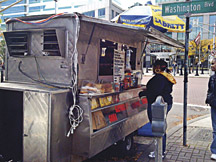Food carts: They’re ubiquitous. They’re convenient. Their food smells good, and it often tastes good, too.
But are they safe?
In this age of swine flu, bird flu, and SARS (remember that one?), should customers trust food that’s stored and cooked in what’s essentially an old truck? Is the food kept in a cold – really cold – refrigerator? Is the food cooked at a temperature that will kill any bacteria in the meat? And how do the cooks wash their hands and utensils?
“You wouldn’t believe the laws we have to follow,” said Alex Fernandez, a California native who sells southwestern cuisine from a food truck in Jersey City, last week. “It’s more [regulated] than you think. It’s just like a restaurant. No different. We’re just on the sidewalk.”
Restaurant owners complain from time to time, especially if they feel the food carts are pulling business away from them.
________
“Eventually, I plan to have a restaurant,” he said. “But this operation is like a mini restaurant and will teach me things I’ll need to know later on.”
So you want to be a food cart vendor
“There are actually strict state regulations that tell you how to inspect [food trucks], and those regulations are taken from the FDA Food Code,” said Frank Sasso, health officer for Hoboken, where there are 33 food cart and food truck licenses.
Municipal health departments issue licenses to would-be vendors, who must first present their food truck or food cart to the health department for inspection.
“Both food trucks and food carts, which are generally hot dog stands, must have a stent thermometer to check the temperature of cooked foods,” said Sasso. “For example, if the food cart is going to sell hot dogs, it must be able to keep the [hot dog] water at 140F degrees. A food truck, where they have refrigeration, just like any restaurant, must be able to keep food cold at 41F degrees. And those temperatures apply for their meats, onions, peppers, anything they’re going to be storing and cooking.”
Vendors must also have a way to clean their hands. Food carts are required to have some type of hand sanitizer, but are not required to have water available for hand washing. Food trucks, as opposed to carts, are required to have a source of water for hand washing, although the water isn’t required to be hot. Carts must also have hand sanitizer in addition to the water.
Also, when vendors give food to customers, they are now required by state law to either wear a glove or have a napkin between their hand and the food. This requirement is the same for hot dog vendors and food carts.
Sasso noted that most food poisoning – from restaurants, supermarkets, home kitchens, and elsewhere – generally stems from improper storage or cooking temperatures.
Once the truck or cart clears inspection, the municipal health department will issue a food vending license, which can cost several hundred dollars, depending on the town that issues the license.
Once in business, the cart or truck gets an annual inspection from the local health department.
Vincent Rivelli, health officer for Secaucus, Weehawken, West New York, and Guttenberg, said, “At the annual inspection, the trucks must be clean and sanitary, although that can be subjective and is up to the individual person doing the inspection.”
City limits
In addition to the state laws, local towns can, and often do, pass their own ordinances to further regulate the food truck business.
But regarding placement of the trucks, some towns allow them to park where they want, while other strictly regulate where they can park.
In Secaucus, for example, Rivelli explained, “We allow trucks to be on private property, but not in the center of town. So, you’ll find a number of food trucks parked behind private businesses. And those trucks serve food to the employees who work at those companies. But you won’t find food trucks in the Plaza, because our ordinance here prohibits that.”
In Secaucus, which has about 18 licensed vendors according to Rivelli, food trucks park behind businesses with the consent of those companies. The companies apparently welcome the vendors since they allow employees to eat without traveling far from their work sites.
Hoboken sets fewer limits on where trucks can park.
“The rule of thumb is, if they are parked and they aren’t blocking traffic and nobody is complaining about them being there, we don’t bother them,” Sasso commented. “The police don’t write tickets, even if they aren’t in a legal space.”
Also, in Hoboken, the city can strip a vendor of a license if even a single health code violation isn’t immediately corrected.
“It’s a punishment that’s never been used because vendors have been quick to correct health violations,” said Sasso. “But we have that ordinance for the vendor who might choose to ignore a violation and refuse to correct it.”
All municipalities set limits on the number of licenses that can be issued to food truck vendors.
Heat from restaurants
Restaurant owners do complain from time to time, especially if they feel the food carts are pulling business away from them.
Fernandez said he hasn’t had any problems at his spot near the Grove street PATH station. But he knows other vendors who have had problems.
“I know there have been some problems over in the Pavonia area,” he said. “Restaurants over there have complained to the cops and the health department about some of the vendors there…The vendors are legal, they have their licenses, and get inspected, just like the restaurants. But it’s about competition. The restaurants don’t want it.”
However, one health inspector quipped, “If you’re a restaurant, and you’re worried about completion from a food cart, maybe you should re-evaluate your menu.”
E-mail E. Assata Wright at awright@hudsonreporter.com.
